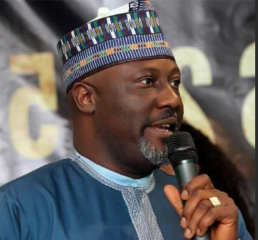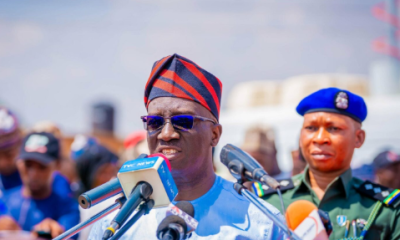Comments and Issues
Umahi: APC, PDP’s fight over ownership of electoral votes
Published
4 years agoon
By
Publisher
By Ehichioya Ezomon
Court rulings on the sacking of Ebonyi State Governor Dave Umahi and Deputy Governor Kelechi Igwe are shaping up to becoming a “locus classicus” – an authoritative passage from a standard work that is often quoted as an illustration; a classic case or example.
The issue at stake is whether votes from an election belong to the political party or its candidate, and if morality should take precedence over legality in deciding electoral matters in court.
One high court has categorically held that a political party owns electoral votes, while two high courts and an appellate court have literally affirmed that votes belong to the candidate.
Another appellate court is looking at the matter that’s dogged the polity, with politicians’ switching of political parties regarded more as an issue of morality than of legality in keeping with laws guiding elections in Nigeria.
From the lower to the appellate courts, Judges seem to uphold this view to be true, and decline to allow sentiment influence their decisions when morality clashes with legality in electoral matters.
If it were otherwise, Judges would be writing laws, and thus usurping the legislative function of the parliament to make laws for the Judiciary to interpret when there’re conflicting issues.
Even as the amended 1999 Constitution punishes defection by members of the legislature with forfeiture of their seats, the courts cautiously apply the rules, hence the rampant decamping by politicians.
The instant matter comes to the public domain aftermath of the ruling of an Abakaliki High Court that upheld the defection of Umahi and Igwe from the Peoples Democratic Party (PDP) to the All Progressives Congress (APC) in November 2020.
But Umahi and Igwe’s judicial victory was cut short on March 8, 2022, by an Abuja Federal High Court, which sacked the duo from the positions of governor and deputy governor of Ebonyi State.
Umahi and Igwe’s sacking refocuses the issue of who owns the votes between a political party and its candidate in an election, and the moral and legal implications of defection by politicians.
Thus, the March 8 judgment of the Federal High Court in Abuja has attempted to solve the twin matters, holding that votes belong to the political party, and ipso facto, morality should take precedence over legality, to curb the unbridled decamping of politicians.
In a case filed by the PDP, Justice Inyang Ekwo held that having defected to the APC, Governor Umahi and Deputy Governor Igwe have lost the legal and moral rights to hold the positions, as the PDP owns the votes that the defectors took to the APC.
The judge relied on the celebrated, but outdated Supreme Court judgment in Amaechi vs Omehia, that electoral votes belonged to the political party and not the candidate sponsored by the party.
Chibuike Rotimi Amaechi had won the PDP primaries for the 2007 governorship poll in Rivers State, but was denied the ticket via an infamous “k-leg” (problem) spun by then President Olusegun Obasanjo, who “awarded” the ticket to Mr Celestine Omehia.
Amaechi was in “self-exile” in Ghana when the 2007 general election held, and Omehia won, and was sworn in as governor, a position he held for a few months before the courts sacked him.
Relieving Omehia of the post, the Supreme Court stated that Amaechi, who secured the PDP ticket at the primaries, was the lawful person to inherit the votes that belonged to the party.
The Amaechi vs Omehia case is overtaken by judgments of the appellate courts, that votes belong to the candidate, who uses the political party as a vehicle to get into office. That’s why election results are declared for the party’s candidate.
Yet, Justice Ekwo ruled that parties own votes, and sacked Umahi and Igwe, and asked the Independent National Electoral Commission (INEC) to withdraw their certificates of return, and issue fresh ones to PDP nominees for governor and deputy governor.
But in what some analysts describe as “a Daniel come to judgment,” the Appeal Court sitting in Enugu has affirmed the decision of a High Court in Abakaliki, Ebonyi State, that a governor or deputy governor can only be removed by constitutional means.
The court ruled in a suit by the governorship candidate and running mate of the APC in the 2019 elections, Sen. Sunny Ogbuoji and Mr Mbam Ogodo, seeking to be sworn-in as the governor and deputy governor in place of Umahi and Igwe.
Following the defection of Umahi and Igwe, Ogbuoji and Ogodo took out a writ at the high court, praying to be enthroned, as they’re the first runners-up behind Umahi and Igwe in the 2019 polls.
They argued that having decamped from the PDP, Umahi and Igwe had lost their positions, and urged the court to declare them (Ogbuoji and Ogodo) as the governor and deputy governor.
Ruling on the pleadings, Justice Henry Njoku of the Abakaliki High Court dismissed the suit as “lacking merit,” as Umahi and Igwe didn’t offend any provisions of the Constitution or the Electoral Act.
Ogbuoji and Ogodo approached the Appeal Court in Enugu, to reverse the Abakaliki court ruling, a plea the court refused, declaring that the appellants lacked the locus to supplant the respondents.
In a lead ruling by Justice J. O. K. Oyewole, the Appeal Court held that there’re no express constitutional provisions for consequences on a governor or deputy governor that decamps to another party.
Justice Oyewole stated that, while Umahi and Igwe’s defection from the PDP to the APC “might appear immoral, they have freedom of association,” as guaranteed by the amended 1999 Constitution.
“Defection of elected executives is not novel in our political system but their removal must be in accordance with the constitution,” the judge said, adding that it wasn’t the court’s duty to make laws or insert words “in the express provision of the constitution.”
A Federal High Court in Abuja, taking “judicial notice” of the Appeal Court in Enugu, held that the defection of Cross River Governor Ben Ayade and his deputy, Prof. Ivara Esu, didn’t offend the Constitution and the Electoral Act, to warrant their removal, as the PDP had prayed.
Delivering the judgment on April 7, Justice Taiwo Taiwo said that going by “the principle of ‘stare decisis’ (judicial precedence),” he was bound by the earlier judgment of the appellate court in Enugu.
Justice Taiwo noted that defection isn’t part of the grounds in sections 180, 188 and 189 of the amended 1999 Constitution for the removal of a governor or his deputy from office.
“The 3rd and 4th defendants (Ayade and Esu) cannot be removed except by constitutional provisions,” the judge said, adding, “Hence, this court has no power to declare their seats vacant except by constitutional provisions. I so hold.”
With all but one court virtually declaring, by implication in the interim, that votes belong to the candidate and not the political party, the question remains contentious, as an Appeal Court in Abuja looks into Umahi and Igwe’s sacking.
Umahi and Igwe have lodged the appeal, to reverse the judgment of Justice Ekwo that dismissed them from office, and mandated the INEC to recognize PDP’s nominees for their positions.
Will the Appeal Court in Abuja affirm the decision of an Abuja Federal High Court that the political party owns votes, and sustain the sacking of Governor Umahi and Deputy Governor Igwe?
Or will the court align with the Appeal Court in Enugu, the Abakaliki High Court and an Abuja Federal High Court that although decamping “might appear immoral,” there’re no legal consequences on the defectors?
It’s a ding-dung affair that keeps the polity guessing, puts Umahi and Igwe in suspense, and leaves INEC in a difficult position to choose which to obey from a plethora of court judgments, to advance Nigeria’s electoral system and democracy.
- Mr. Ezomon is Political Analyst and Media Consultant, he writes for National Daily
You may like


HURIWA slams EFCC as Tinubu’s attack dog, Says Tambuwal’s arrest is intimidation tactic against opposition


Tension rocks ADC coalition as EFCC targets key members over corruption probes


Dino Melaye exits PDP, calls it an APC ‘Parastatal’


APC Chieftain, Eze Chukwuemeka, Accuses Tinubu of “Electoral Fraud” Plot for 2027


Edo PDP accuses Gov. Okpebholo of taking false credit for Benin-Asaba Expressway Project


Revealed: ADC founder Nwosu accuses Kachikwu of paid coalition sabotage
Trending

 Latest3 days ago
Latest3 days agoYoruba film industry mourns as popular actress aunty Ajara passes away

 Trends4 days ago
Trends4 days agoTonto Dikeh reunites son with Churchill after decade-long split

 Energy1 week ago
Energy1 week agoNNPC unveils gas master plan to boost Nigeria’s energy sector

 Education1 week ago
Education1 week agoAchievers University expels 15 female students over indiscipline

 Business6 days ago
Business6 days agoRite Foods positions industry as catalyst for Nigeria’s clean energy transition

 Football6 days ago
Football6 days agoArsenal’s Osman Kamara completes permanent move to Blackburn Rovers

 Health5 days ago
Health5 days agoControversial preprint revives vaccine–autism debate, draws sharp pushback from medical experts

 Featured6 days ago
Featured6 days agoMidnight raids, teargas: Lagos deploys military-era tactics in mass evictions

